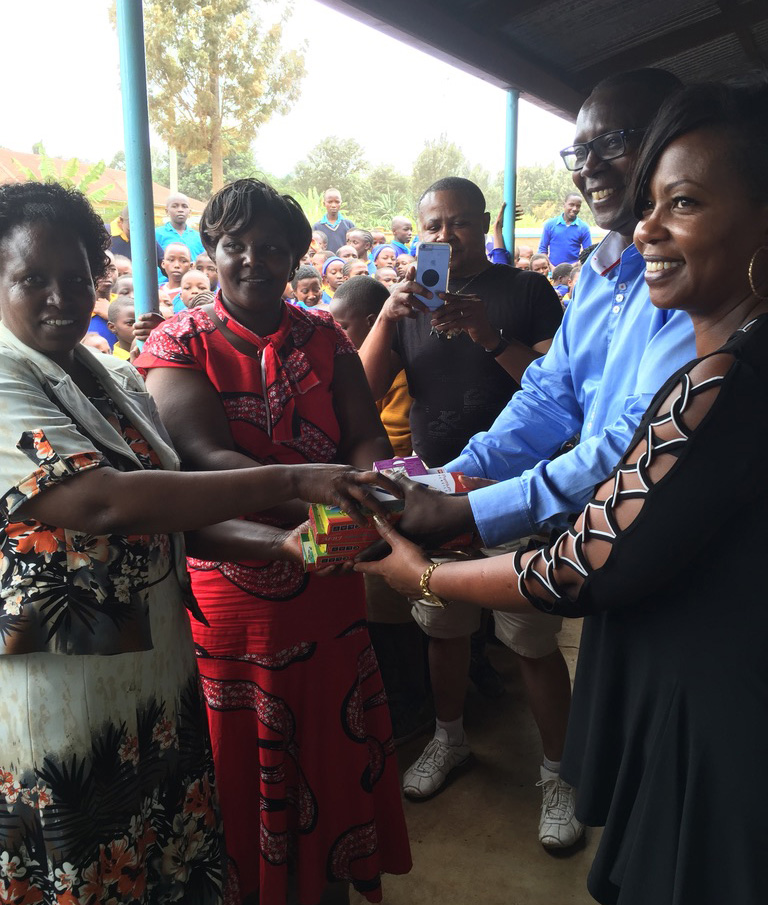
A quarter century of service at USask
Let’s turn back time 25 years to 1997, when Jean Chrétien was re-elected prime minister, the blockbuster movie Titanic premiered in theatres, Tiger Woods became the youngest golfer to win the Masters at age 21, and the first book in the soon-to-be wildly successful Harry Potter series was published.
By James Shewaga
It was also the year that Dr. George Mutwiri (DVM, PhD) stepped foot on campus at the University of Saskatchewan (USask), first as a researcher at the Vaccine Infectious Disease Organization (VIDO), and then as a professor in USask’s School of Public Health (SPH). Fast-forward 25 years and eight months later and Mutwiri is now a member of the senior leadership team at USask as the interim executive director of SPH (current appointment period February 2021-2023 and previously served in the same role from 2015-17).
As a young boy growing up in a small village in Kenya, Mutwiri could have never imaged he would be where he is today.
“It’s very unlikely that I was going to be here,” said Mutwiri, who is one of the longest-serving Black faculty members on campus. “If you go back to my roots, I was born in a village back in Kenya and I didn’t know very many people who went to university, until much later in life when one of my uncles did. The odds were I would be doing what the other boys did, such as looking after cattle and goats. But then my parents encouraged me to go to school. That was where the future was. Education changed my life. It’s a dream that came true."
As the university celebrates and spotlights Black History Month throughout the month of February, Mutwiri has embraced becoming a role model for young students and young researchers at USask, from near and far.
“At this stage of my career, I am looking for opportunities to inspire people into furthering their education,” said Mutwiri. “I encourage disadvantaged students from Kenya and other parts of Africa and I take them under my wing and mentor them, something I didn’t have the opportunity to do when I first arrived in Canada in 1988. It is a privilege to help change someone’s life by giving them an opportunity to further their education, especially students from ordinary families. I am pleased to say that all end up in very good careers.”
The story of Mutwiri’s career began four decades ago when he left his home village of Nkabune in Meru county and moved to Nairobi—the capital of Kenya—and earned his Doctor of Veterinary Medicine at the University of Nairobi in 1985, opening up a world of possibilities. After lecturing for three years, he headed overseas to Canada for the first time, earning his PhD in immunology and microbiology at the University of Guelph in 1994 followed by post-doctoral training at the University of California-San Diego from 1994-97, before accepting a research position with VIDO at USask in 1997.
After growing up in the tropical African republic of Kenya, moving from the equator to a country that reaches the Arctic Circle was a shock to the system.
“It was a culture shock, that’s for sure,” said Mutwiri. “It was the first time I was out of the country, the first time I ever got onto a plane, and I didn’t know anybody in Canada. And that was the very first time that I saw snow and it was quite an experience. I would tell people in Kenya about the cold and they wouldn’t believe that it gets colder than in a refrigerator! I still can’t ski or skate, but I have acclimatized to it.”
Truth be told, George and his wife Betty Mutwiri—who were engaged at the time—had originally planned to return home to Kenya after George earned his PhD at Guelph. But opportunity knocked and they were soon off to California first for his post-doc and then back to Canada to conduct research at VIDO on the USask campus, and have never left.

“From early years in university, I had determined that I would go to study in another country, in a new culture, learn new things and then come back to Kenya to my old faculty job at the University of Nairobi. However, by the time I completed my studies we were a family of three and we made the decision to make our home in North America,” said Mutwiri, who moved from VIDO to SPH in 2009. “We had moved to Saskatoon for one, maybe two years, and then move on. But very quickly Saskatoon became home, to the extent that there were a lot of opportunities to go to some other places, but we thought that Saskatchewan was a great place to raise a family. It’s been great. We all, one way or another, have been associated with the University of Saskatchewan.”
USask has indeed become home, with George working on campus for a quarter of a century, while his wife Betty—a renowned leadership coach and consultant who was named one of Canada’s Top 100 Black Women to Watch in 2022—is now working on her PhD in Educational Leadership and Administration at USask. Meanwhile, their first-born daughter Vanessa graduated from the College of Arts and Science and now works in Saskatoon, and youngest son Gitonga just started his first year in the College of Kinesiology, while oldest son Dr. George Mutwiri Jr. (MD) graduated from the College of Medicine and now works as a resident physician in Calgary.
Before graduating from USask in 2021, Mutwiri’s eldest son helped co-found the USask Black Medical Students Association in 2020, one of a growing number of groups created to support an increasing Black student population on campus. When George Sr. started his career at USask in 1997, there were significantly fewer Black faculty, staff, and students on campus than there are now. More than 400 students from Nigeria alone now lead a growing number of African international students at USask in the 2022/23 academic year.
Mutwiri said it is important to spotlight and celebrate the diversity on campus through student group initiatives and the university’s Black History Month activities and events.
“It is very important because it reminds of us how far we have come and it is good to celebrate who we are, and we need that space and these moments to do so,” said Mutwiri. “Number 2, this creates a spotlight for others who are not Black to celebrate with us, and that is very important. Black History Month is not just for Black people to celebrate. It’s for all of us to celebrate together.”
Mutwiri said much has changed during his time at USask, with the celebration of Black History Month and initiatives like the Equity, Diversity, and Inclusion (EDI) Policy, and the Indigenous Strategy helping create a better campus for all.
“In the university here in my 25 years, we have come a long way,” said Mutwiri. “Over time, a big step has been the leadership of the university has stepped forward. President (Peter) Stoicheff has led from the front in this space, and the Provost Airini is very committed, she even leads a book club during Black History Month. Other senior leaders have also responded very well. And you can see that in related areas like Indigenization and EDI, and with Black History Month, the signing of the Scarborough Charter, and the formation of the Black Faculty and Staff Caucus, the university has responded well within a relatively short time.

“And leaders now undergo anti-racism training, so it is a very big step in the right direction. When leadership steps up, suddenly everyone is paying attention. We can’t say that we have won the war yet, there’s still a lot of work to be done, but we are certainly on the right trajectory and we have momentum.”
Mutwiri is proud of how far the university has come and continues to embrace change and open doors for all students, with the university now attracting students from more than 130 countries.
“I’m very proud of a lot of things, but from this position, looking back through my career here, I am proud that I do inspire, even in a small way, a lot of Black students, and from other cultures as well,” he said. “And having been here this long and having risen to senior leadership, people see that this university is embracing diversity, inclusion, and equity, and sees beyond the colour of your skin, to one’s character. And I am inspired by that.”
As he approaches his fifth year as interim executive director of SPH, he is also excited about the future of the USask school, and how it can adapt to the public health lessons learned throughout the ongoing pandemic.
“We have learned a number of things and it challenges us to look at the training we do, from a different lens,” said Mutwiri. “We knew human behaviour can affect vaccination rates, for example, but we didn’t know it would be such a big challenge that you could have a vaccine that some people don’t want to take, and we didn’t know that could actually become so politicized in a first world country like Canada. So those challenges are very much in the forefront and we have to tweak some things that exist in the curriculum of public health.
“We have to make sure we are continuing to build relationships with government, with business and with non-profit organizations that would typically not be considered part of the public health system, but are involved. We are exploring these things and adapting our vision for our programs in the School of Public Health.”
Visit USask’s Black History Month website for more stories and information on events happening on campus and in the community during the month of February.
Article re-posted on .
View original article.
